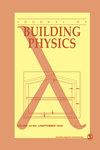加拿大未来气候情景下木结构厚墙组件对雨水湿润的湿热响应
IF 1.4
4区 工程技术
Q3 CONSTRUCTION & BUILDING TECHNOLOGY
引用次数: 0
摘要
在以供暖为主的国家,针对低能耗需求的新建低层住宅建筑,目前的外墙装配设计包括分层保温墙和厚墙装配设计。与建筑规范规定的最低装配相比,这两种设计都能提高热效率,但长期的湿热性能会因边界条件和建筑缺陷的存在而不同。根据未来的气候预测,许多以供暖为主的气候地区的供暖度日小时数将减少,年降雨量将增加。利用通过被动式房屋认证的设施中经过验证的装配性能数据,进行了一项敏感性分析,以确定雨水润湿、空气渗漏和保温材料特性对厚壁装配的湿热响应的影响。结果表明,雨水渗漏值达到或超过组件外表面附着降雨量的 0.50%,会导致最大的失效风险。然后,在全球气温上升 3.5 摄氏度的情况下,对加拿大五个地理位置的装配式建筑的湿热反应进行了研究。结果表明,当出现雨水泄漏时,年平均降雨总量的增加并不会直接导致组件故障率的增加。其他气候因素,包括室外气温、降雨量和太阳辐射都会影响组件的湿热响应,因此在模拟未来气候变化情景下的性能时需要加以考虑。本文章由计算机程序翻译,如有差异,请以英文原文为准。
Hygrothermal response of a wood-frame thick-wall assembly to rainwater wetting under future climate scenarios in Canada
Current exterior wall assembly designs for new low-rise residential buildings targeting low-energy demand in heating dominated countries include split-insulation wall and thick-wall assembly designs. Both have been shown to result in thermal efficiency gains compared to building-code minimum assemblies, however long-term hygrothermal performance can vary depending on boundary conditions and the presence of construction deficiencies. Future climate scenarios estimate many heating-dominated climates will experience a reduction in heating-degree day hours and an increase in annual rainfall. Using validated assembly performance data from a Passive House certified facility, a sensitivity analysis is performed to determine the impact of rainwater wetting, air exfiltration and insulation material properties on the hygrothermal response of a thick-wall assembly. Results show that rainwater leakage values of 0.50% and greater of the adhering rainfall on the exterior surface of the assembly results in the greatest risk for failure. The hygrothermal response of the assembly is then examined under a global temperature rise scenario of 3.5°C for five geographic locations across Canada. Results show that an increase in average annual total rainfall does not directly result in an increase in the failure rate of the assembly when a rainwater leak is present. Additional climatic factors, including outdoor air temperature, driving rain and solar radiation received will influence the hygrothermal response of the assembly and need to be considered when modelling the performance under future climate change scenarios.
求助全文
通过发布文献求助,成功后即可免费获取论文全文。
去求助
来源期刊

Journal of Building Physics
工程技术-结构与建筑技术
CiteScore
5.10
自引率
15.00%
发文量
10
审稿时长
5.3 months
期刊介绍:
Journal of Building Physics (J. Bldg. Phys) is an international, peer-reviewed journal that publishes a high quality research and state of the art “integrated” papers to promote scientifically thorough advancement of all the areas of non-structural performance of a building and particularly in heat, air, moisture transfer.
 求助内容:
求助内容: 应助结果提醒方式:
应助结果提醒方式:


